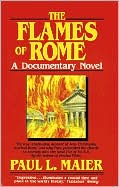

 |

|

The average rating for The Flames of Rome: A Documentary Novel based on 2 reviews is 4 stars.
Review # 1 was written on 2014-09-20 00:00:00 Lynn Bass Lynn BassIf you read the preface, the author suggests this book is more "Documentary Fiction" than a pure historical novel, and if you read with that mindset you will not be disappointed. It is certainly more well-researched history than creative fiction, but Maier does fill in some historical gaps with plausible details and conversations that transfer well into the "story" mindset. On a more specific note, I appreciated how Maier wove together the story of Rome with appearances from the apostolic fathers (Peter, Paul, Luke). As a Christian, it helped me understand the general timeline of secular and early church history, and catch of glimpse of how things "might have happened" in that first century. I also appreciated his lengthy section of notes at the end of the book. It added more detail, and clarified the inclusion (or exclusion) of certain stories and characters. |
Review # 2 was written on 2014-04-29 00:00:00 Dale Diede Dale DiedeSome kind of spark was missing but I did keep reading to find out about Sabinus [the protagonist and brother of Vespasian, who overshadowed him in life]. I wanted to like this novel more than I did. The novel followed very closely the historical record [mostly primary but some secondary sources]. Much of the novel was devoted to the expansion of Christianity to and in Rome, even after the Great Fire, which the author painted as not set deliberately. The author posits it starting in an oil merchant cum builder's shop. Many historians of today agree with the assessment that the Fire was an accident. The retaliations against Christians as described were horrendous, but mentioned in ancient sources. The story takes Sabinus from his return to Rome from the military in Britannia; service as a senator; marriage into the Plautius gens; and terms of office as census taker in Gaul and Roman City Prefect [equivalent of mayor]. The novel brings out his role in the plot against Nero. The author did make him sympathetic towards and helpful to Christians; the real-life Sabinus was a decent and peace-loving man, probably a Stoic. I liked the descriptions of the several outlandish assassination attempts on Agrippina; she was certainly 'a cat with nine lives' who finally used them all. I liked the coverage of Pomponia Graecina's religious trial by her family. I liked in the last part Lucas [Luke] telling Sabinus that he is using a coded form of his complete name, the first three sounds of 'Titus Flavius Sabinus' meaning 'Theophilus' for Luke's dedication to him of the "Acts." This is fiction, but I'd like to think it might be true. I admire the author as a historian and his use of the sources, but he lacked something as a novelist. Each character was actually historical, but all of them came across as wooden except for Sabinus himself. Claudius and Nero were the usual cartoonish stereotypes. Dialogue was nothing remarkable and was stilted. As much as or more than the novel itself, the end notes were most interesting: from where the author got his information and how he used it. Those are worth reading. The orgy scenes were probably risqué for when the book was written [1981], but they are very tame today. It is worthwhile for the history of that period and explanation of the Latin terms, e.g., the voting system at a trial: A [Absolvo], C [Condemno] or NL [Non Licet=not proven=in today's parlance, Abstention]. |
CAN'T FIND WHAT YOU'RE LOOKING FOR? CLICK HERE!!!